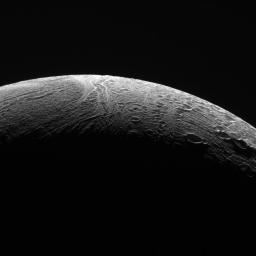
|
Features of the North
- Click the image above for a larger view
- Full-Res JPEG (1020 x 1020) (63.4 kB)
- Full-Res TIFF (1020 x 1020) (419.6 kB)
Caption:
NASA's Cassini spacecraft peered out over the northern territory on Saturn's moon Enceladus, capturing this view of two different terrain types. A region of older terrain covered in craters that have been modified by geological processes is seen at right, while at left is a province of relatively craterless, and presumably more youthful, wrinkled terrain. Cassini acquired the view during its final close flyby of Enceladus, on Dec. 19, 2015.
North on Enceladus is up and rotated 38 degrees to the left. The image was taken in polarized green light with the Cassini spacecraft narrow-angle camera.
The view was acquired at a distance of approximately 21,000 miles (34,000 kilometers) from Enceladus and at a Sun-Enceladus-spacecraft, or phase, angle of 145 degrees. Image scale is 668 feet (204 meters) per pixel.
Background Info:
The Cassini-Huygens mission is a cooperative project of NASA, the European Space Agency and the Italian Space Agency. NASA's Jet Propulsion Laboratory, a division of the California Institute of Technology in Pasadena, manages the mission for NASA's Science Mission Directorate, Washington. The Cassini orbiter and its two onboard cameras were designed, developed and assembled at JPL. The imaging operations center is based at the Space Science Institute in Boulder, Colorado.
For more information about the Cassini-Huygens mission visit http://saturn.jpl.nasa.gov and http://www.nasa.gov/cassini . The Cassini imaging team homepage is at http://ciclops.org .
Cataloging Keywords:
| Name | Value | Additional Values |
|---|---|---|
| Target | Saturn | Enceladus |
| System | Saturn | |
| Target Type | Planet | Satellite |
| Mission | Cassini-Huygens | |
| Instrument Host | Cassini Orbiter | |
| Host Type | Orbiter | |
| Instrument | Imaging Science Subsystem (ISS) | |
| Detector | Narrow Angle Camera | |
| Extra Keywords | Crater, Grayscale, Rotation, Visual | |
| Acquisition Date | ||
| Release Date | 2015-12-21 | |
| Date in Caption | 2015-12-19 | |
| Image Credit | NASA/JPL-Caltech/Space Science Institute | |
| Source | photojournal.jpl.nasa.gov/catalog/PIA17211 | |
| Identifier | PIA17211 | |
